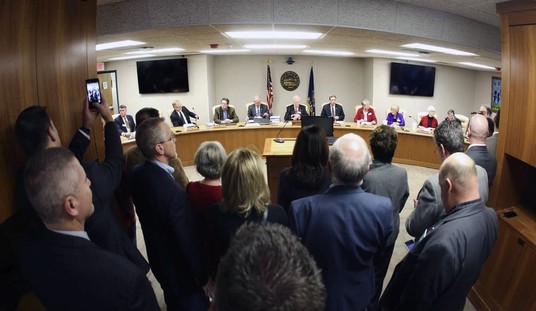Egypt is the largest nation in the Arab world and the fulcrum of American foreign policy among Arab nations. Its streets are ablaze with fires; its police have been withdrawn and replaced by the army; an attempt by President Hosni Mubarak to quell the rioters has only inflamed them further. The Obama administration is responding as if it is tiptoeing through a mine field. Those waiting for American leadership have to contend with the empty platitudes of Secretary of State Hillary Clinton, who is urging restraint on the Mubarak regime.
The scene is all too reminiscent of the Iranian revolution of 1979. Then, President Jimmy Carter not only demanded restraint but also had his administration work behind the scenes to bring down the shah. Carter believed he was watching a democratic revolution unfold, one led by Mehdi Bazargan, Sadegh Ghotbzadeh and Abulhassan Banisadr. Neither Carter nor his advisers understood that this democratic-centrist revolution, like those in Europe, would be short-lived. Bazargan resigned from the government over its authoritarian turn; Ghotbzadeh was shot by a firing squad; and Banisadr fled to France, where he currently lives under heavy police protection.
As someone who spent decades studying riots, revolutions, and other forms of civil violence, I have some advice for the administration:
Hillary Clinton might consider remaining silent for the duration of the event. One of the dramatic non-PC findings of the Kerner Commission Report on our own experiences with civil unrest is that even a legitimate government that hesitates in the face of riots will both inflame and contribute to the duration and intensity of violence. Riots end when there are swift, decisive, and appropriate responses to the violence. Riots persist when the police hesitate, when the police are restrained, and when the rioters feel they are in control.
Studies of revolution, including the Russian Revolution, show that the loyalty of several companies of armed, disciplined, and well-led soldiers willing to continually fire into the mobs would crush any revolution. Such an observation sounds barbaric until you consider the millions of lives that are needlessly wasted in a revolution and its aftermath. Imagine if the second Russian Revolution, the October Revolution, the one the Communists made, had been stopped in its tracks: no Lenin, no Civil War, no Stalin, no Gulags, no invasion of Poland, no totalitarian dictatorship. The taking of a few hundred or thousand lives in the streets of St. Petersburg would have saved the lives of countless millions.
Revolutions are like a cart running downhill, as Alexis de Tocqueville observed in his brilliant analysis of the French Revolution. The American media is focused on the demand for democratic reform voiced by the mobs in the streets of Egypt. But revolutions don’t stop with the initial demands. Revolutions create power vacuums that draw new players with different agendas from those who initially sought to make the revolution. Revolutions move to the extremes, usually to the left. Those who join the mob to demand more liberty will ultimately create a regime that extinguishes all liberty. Did those who ran through the streets of Paris in July 1789 think they were revolting for the ensuing “Terror”? Did the workers who charged the Winter Palace in 1917 think they were fighting for the Gulag? Did Banisadr and Ghotbzadeh think they were replacing the shah of Iran with a theocracy?
The choice in the streets of Egypt is not Mubarak or democracy. It is Mubarak or the Muslim Brotherhood. It is the Muslim Brotherhood, like the ayatollahs of Tehran, who are the best situated to benefit from and direct the revolution, unless of course the Egyptian military holds firm.
If the Brotherhood comes to power, it will behave as did its proxy in Gaza: one man, one vote, one time, with the opposition shot in the legs and thrown off rooftops.
I will not write a brief for the oligarchy nor would I have written one for the shah. But just because you can visibly see evil does not mean that its elimination will produce something better.As the aphorism of revolution states, “Like Saturn, the revolution devours its own children.” And in so doing becomes something its creators never intended.
Our first order of business in Egypt is to produce stability and then to do something we have not done before: Assist the Egyptians in finding a mechanism for a transition to reform through an evolutionary rather than revolutionary path. The only institution capable of doing this is the Egyptian military. They should not be abandoned as was the Iranian military.
Had Obama done more than basked in the adulation of his Cairo speech and actually leaned on the regime to evolve toward a more legitimate and inclusive government, we might not be confronting the mess ahead of us.
For decades we have been dumping billions of dollars worth of advanced weapons into Egypt. A revolution means that those weapons could fall into the hands of the Muslim Brotherhood. This will tilt the balance of power in the Middle East. Emboldened by success in Egypt, radical Islam will next show its power in the Gulf and threaten the world’s oil supply. Already there are riots in Yemen.
The world as we knew it might just spin out of control. It remains to be seen if the Egyptian military, with or without our support, will rise to the task of restoring order and stability in Egypt and become a vehicle for vital political change. But if Obama emulates the horrendous decisions Jimmy Carter made during the Iranian revolution, radical Islam will spread through the region like a forest fire with the Saudis facing the ultimate conflagration.









Join the conversation as a VIP Member